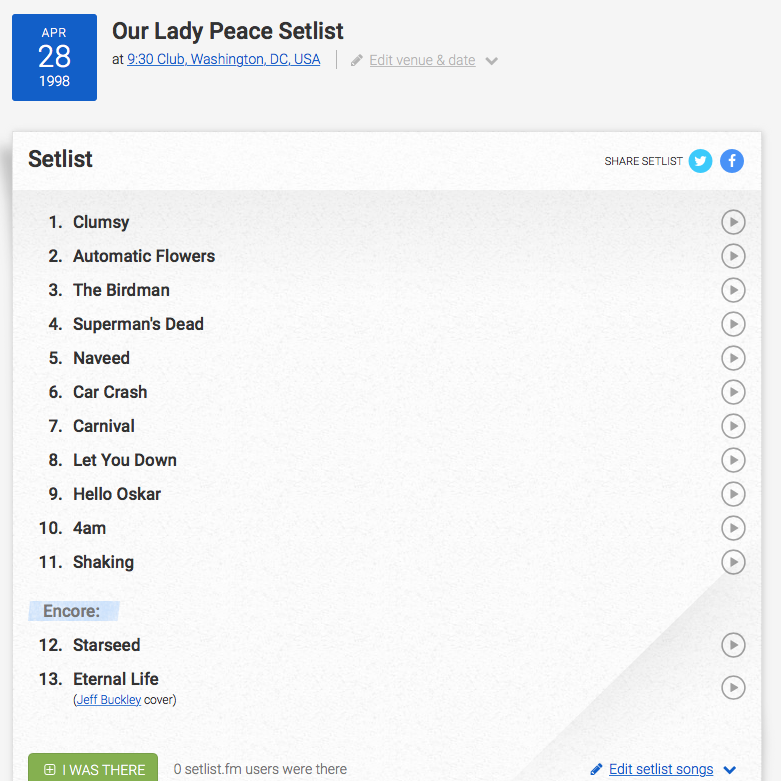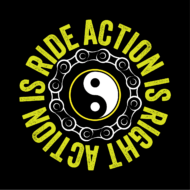If you follow the music industry/world at all, you may have heard about the NPR/David Lowery back and forth, if not, here’s a quick lowdown.
An NPR DJ, Emily White posted a blog entry about her large – and relatively unpaid for – music library which sparked a lot of discussion. Dave Lowery (someone I have tremendous respect for as a songwriter and musician) heightened my respect for him by penning a very eloquent and well thought out response. It’s long, but if you’re a fan of music at all I suggest you take in the whole thing.
In response to that, another musician I’m a fan of, Matthew Good, wrote this, which is also very thought provoking.
All of that reading – which I suggest you do, got me thinking.
There was a time period – when I was young and single and had the metabolism to eat a lot of peanut butter and jelly sandwiches – that I spent what most would probably consider an obscene amount of money buying music.
I’d get my weekly paycheck and troll the used CD stores (I mostly bought used, but some new too) and spend hours ‘clicking’ (such a wonderful sound) through the racks of CDs looking for treasure.
I had an anywhere from 10 to 20 CD a week habit. I’d keep some of them, sell others back that I didn’t like – to feed the monkey.
When the technology started to become available, I’d burn copies of CDs from friends if they had something I liked. Sometimes it was only until I could get a hold of the actual release, sometimes not. I was always an ‘album’ guy, digging the packaging and liner notes as much as the tunes almost.
I rationalized that – though it was piracy – it was the 90’s equivalent of making cassette copies back in the day, either from other cassettes or vinyl. To me it wasn’t a very big deal and the recording industry seemed to have survived that.
Initially, when it became pretty easy to download anything you wanted for free on the internet, I shunned it. I was a bit of a purist. I had a lot of friends who were musicians and it didn’t seem right. But gradually, economic reality seeped in and I cheated here and there for stuff I really wanted, but maybe couldn’t afford or didn’t want to wait for.
Eventually, like any junkie, I fell into the full-fledged habit. It became ridiculously easy to download entire back-catalogues or discographies of artists I was interested in. I sometimes justified it in the case of some artists I’d never heard of by telling myself I just wanted to ‘try ’em out’ and make sure I liked the stuff before I bought it. At some point, even if I liked it, I just stopped getting around to buying.
I’m somewhat ashamed to say I amassed a huge collection of music. Silly part is, some of it, I’d never even get around to listening to. I’d download volumes of stuff just ’cause it was available with an ‘I’ll check that out later’ attitude, and many times forget I’d even downloaded it. New releases too. I’d grab stuff before it was out – leaked prior to release dates (how infuriating that must be to an artist, I’d think) – and sometimes feel a pang of remorse, but the monkey didn’t.
Reading Dave’s article something struck me:
The fundamental shift in principals and morality is about who gets to control and exploit the work of an artist. The accepted norm for hudreds of years of western civilization is the artist exclusively has the right to exploit and control his/her work for a period of time. (Since the works that are are almost invariably the subject of these discussions are popular culture of one type or another, the duration of the copyright term is pretty much irrelevant for an ethical discussion.) By allowing the artist to treat his/her work as actual property, the artist can decide how to monetize his or her work. This system has worked very well for fans and artists. Now we are being asked to undo this not because we think this is a bad or unfair way to compensate artists but simply because it is technologically possible for corporations or individuals to exploit artists work without their permission on a massive scale and globally. We are being asked to continue to let these companies violate the law without being punished or prosecuted. We are being asked to change our morality and principals to match what I think are immoral and unethical business models.
…
What the corporate backed Free Culture movement is asking us to do is analogous to changing our morality and principles to allow the equivalent of looting. Say there is a neighborhood in your local big city. Let’s call it The ‘Net. In this neighborhood there are record stores. Because of some antiquated laws, The ‘Net was never assigned a police force. So in this neighborhood people simply loot all the products from the shelves of the record store. People know it’s wrong, but they do it because they know they will rarely be punished for doing so. What the commercial Free Culture movement (see the “hybrid economy”) is saying is that instead of putting a police force in this neighborhood we should simply change our values and morality to accept this behavior. We should change our morality and ethics to accept looting because it is simply possible to get away with it. And nothing says freedom like getting away with it, right?
I’ll in no way lay the blame on corporations or ‘Free Culture’. I accept full blame myself. Reading the article, what I realized is that it really isn’t an economic or intellectual rights issue (well, it is sorta both as well), but for me, it’s an ethics issue.
Over time, I’d changed my own definition of what was morally right with regards to this issue. I’d sorta adapted it to suit my own situation. Sure, I felt enriched and expanded because I felt worlds of new artistry was available to me that I didn’t readily have access to before, but I realized I’d compromised my own ethics. That made me feel kind of sick.
I still count amongst my friends many musicians garnering various levels of success. How could I support their work, while directly undermining the livelihood of others? Had I become that hypocritical just for the sake of saving a buck?
One of the more candid artists out there, Matthew Good, routinely discusses the realities of his life in his blog, trying to juggle the economics of touring and recording budgets while raising a family and running a household – just like I am. His music, in addition to being his art, is his livelihood, just like my job is for me. How would I feel if one day he could no longer make music commercially because it simply wouldn’t pay the bills? Would that be partly my fault? How sadly ironic would that be?
After a couple of days of introspection, I went home the other day and deleted everything I’d downloaded illegally or hadn’t paid for. I know that this won’t ‘undo’ anything and I’m not looking for any sort of ‘pat on the back’. I just wanted to start with a clean slate.
I wanted to get back to where I started in music – supporting and valuing it vs. ‘collecting’ it. I felt bad about devaluing what these artists produce by stealing it. I realized the hypocrisy I was engendering by trying to promote right and the higher road in so many other aspects of life and not this.
The value has to be restored in what these artists give us. We have to reshift our thinking back. I’m starting now. It really is a simple matter of choice.
Like many other things in life, just because we can get away with it, doesn’t mean we should.

